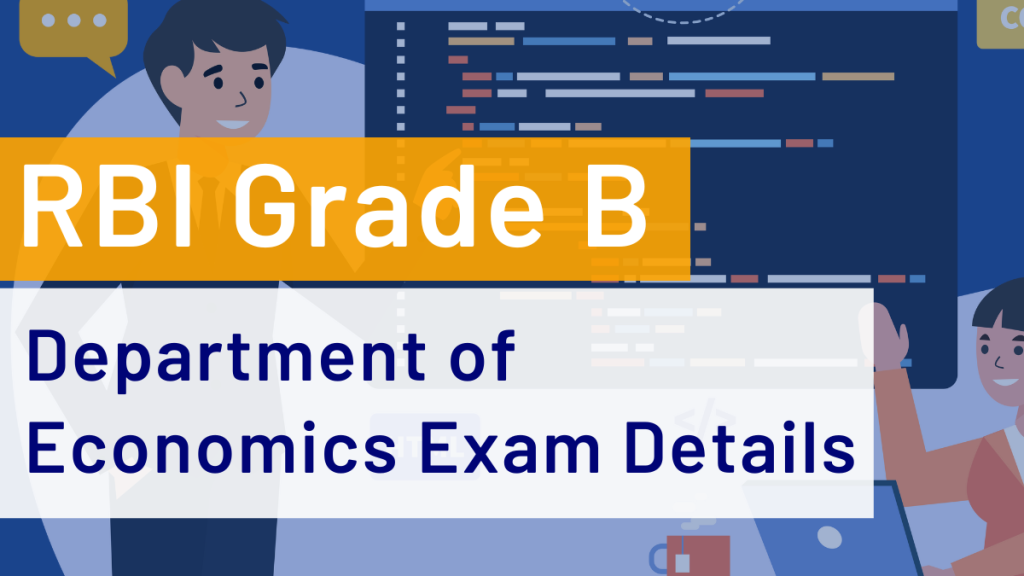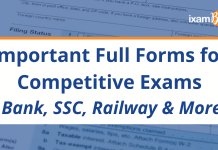Embarking on a career as a Grade B (DEPR) Officer with the Reserve Bank of India (RBI) is a coveted opportunity that economics graduates aspire to seize annually. Not only does it offer a chance to contribute significantly to the nation’s economic growth, but it also provides a platform for professional advancement. The RBI Grade B DEPR exam, a highly competitive endeavor, features three papers, including descriptive ones for Economics (handwritten) and English (typed).
Crafting effective answers for these RBI Grade B DEPR descriptive papers, alongside possessing the requisite knowledge, has proven to be a challenging task for many aspirants. The key lies in articulating responses coherently and expressing views within time constraints. This blog aims to guide and support aspiring candidates through their RBI Grade B DEPR preparation journey.

RBI Department of Economics & Policy Research (DEPR) Recruitment
Anticipation is building for the Reserve Bank of India’s (RBI) Grade B DEPR notification in 2025, expected to be released in the first quarter. The RBI DEPR is a crucial division dedicated to delivering valuable research insights and managing a robust Management Information System (MIS) related to macroeconomic and financial matters. This data is instrumental in shaping effective policies and strategies, contributing significantly to the nation’s economic stability. The annual recruitment drive for RBI Economist recruitment (RBI Grade B DEPR) includes positions not only for DEPR but also for RBI Grade B DSIM and Grade B General, underscoring the comprehensive nature of the hiring process. Aspirants are urged to thoroughly review the official RBI Grade B DEPR recruitment process detailed on this page to grasp the full scope of this significant opportunity.
The role of an RBI Grade B DEPR officer is inherently tied to conducting economic analysis and research, with a direct impact on policy formulation. The establishment of the Department of Economic Research and Policy Research RBI in 1959 was a response to the burgeoning activities of the Bank. Over the years, to better focus on economic issues, the RBI Department of Economic and Policy Research underwent a significant reorganization in January 1982, evolving into the Department of Economic Analysis and Policy (DEAP).
The DEPR RBI Grade B is a pivotal knowledge center for macroeconomic policy research at the RBI, providing research inputs and updating MIS on macroeconomic and financial issues crucial for policy-related decision-making. The Department of Economic Research and Policy Research RBI’s research agenda addresses the macroeconomic challenges faced by the Indian economy, spanning monetary policy dynamics, growth and inflation patterns, financial market analysis, forecasts of macroeconomic factors, banking sector evaluations, financial stability assessments, and external sector management. As prospective candidates gear up for the RBI Grade B DEPR exam, ixamBee stands ready with a wealth of resources to aid in comprehensive preparation, enhancing the prospects of success in this coveted examination.
Functions of RBI Grade B DEPR
The RBI Department of Economic and Policy Research (DEPR) plays a pivotal role in shaping the nation’s economic landscape through its multifaceted functions. From the meticulous publication of statutory reports to providing primary statistics on crucial economic indicators, DEPR RBI stands at the forefront of information dissemination and policy advice. Let’s take a look at the major functions of the RBI Grade B DEPR below:
- Report Publication: Reserve Bank’s Statutory and Other Reports: The RBI Department of Economic and Policy Research diligently releases statutory reports, such as the Annual Report and the one on the Trend and Progress of Banking in India. Beyond these, it also publishes various other reports, including State Finance: A Budget Study, the Reserve Bank of India Bulletin, the Indian State Statistics Handbook, and insightful RBI Occasional Papers. Additionally, the DEPR RBI takes pride in chronicling the rich history of the Reserve Bank through its publication, “The History of the Reserve Bank.
- Primary Statistics Compilation: Economic and Financial Indicators: A crucial function of the RBI DEPR involves providing primary statistics on essential economic indicators. This includes comprehensive data on monetary aggregates, the balance of payments and external debt, the flow of funds, financial savings, and state finances. These statistics are fundamental references for policymakers, economists, and financial analysts, contributing to informed decision-making in India’s economic landscape.
- Policy Advice and Assistance: Guiding the RBI on Economic and Financial Developments: The RBI DEPR actively advises and assists the RBI on policy issues, particularly those related to economic and financial developments in India and abroad. Serving as a key advisory body, RBI Department of Economic and Policy Research plays a pivotal role in shaping monetary and financial policies to navigate the dynamic economic landscape. This advisory function ensures that the RBI is well-informed and equipped to make strategic decisions in response to evolving economic conditions.
- Policy-Oriented Economic Research: A Crucial Undertaking: Undertaking policy-oriented economic research is a cornerstone of the department’s activities. Functioning as a primary data source for monetary aggregates, the balance of payments, household financial savings, state finances, and capital markets, the department conducts rigorous research to provide valuable insights. This research covers the real and fiscal sectors and the entire spectrum of the financial system, contributing to a holistic understanding of economic dynamics.
- Economic and Financial Reports Preparation: In-Depth Analysis for Decision-Making: The department is responsible for preparing detailed economic and financial reports and reviews for the Committee of the Central Board. These reports offer in-depth analyses of various economic facets, providing a comprehensive understanding of strategic decision-making. Moreover, the Department of Economic Research and Policy Research RBI maintains an up-to-date management information system on macroeconomic and financial issues for the RBI, ensuring that decision-makers have access to the latest and most relevant data.
- Comprehensive Policy-Oriented Research Activities: Encompassing the Financial System: The Department of Economic Research and Policy Research RBI’s commitment to policy-oriented research is evident through its constant activities covering the entire financial system. In addition to the real and fiscal sectors, the department engages in research activities that span monetary aggregates, the balance of payments, household financial savings, state finances, and capital markets. This broad scope ensures a thorough and nuanced understanding of economic dynamics, facilitating well-informed policy decisions.
RBI DEPR Job Profile
The RBI DEPR has a cadre of specialized officers who primarily contribute their expertise to four key departments. These departments encompass the DEPR itself, the Monetary Policy Department (MPD), the International Department (Intl Dept), and the Strategic Research Unit (SRU). While the DEPR RBI officers predominantly operate within these units, noteworthy expansions in recent years led to the establishment of the Intl Dept and SRU. Additionally, DEPR RBI officers may find placements in various other departments, including the Department of Statistics and Information Management and several operational units, where most staff comprises ‘general side’ officers.
In the operational departments, Department of Economic Research and Policy Research RBI officers are typically limited to one or two per department, offering specialized insights in areas such as Internal Debt Management, External Investments and Operations, Financial Markets Regulation, Financial Markets Operations, Banking Regulation, and the Financial Stability Unit. This strategic deployment balances specialized knowledge and a broader operational perspective. Furthermore, DEPR maintains a presence in RBI’s older regional offices, contributing their expertise to regional financial considerations, and one DEPR cadre officer serves as a faculty member at the Reserve Bank Staff College, reinforcing the educational aspect of the cadre’s role.
Preparation Strategy for the RBI Grade B DEPR Exam
For candidates aspiring to work at the Reserve Bank of India, RBI Grade B DEPR 2025 will be a great opportunity once the new RBI Grade B DEPR notification is out. The key to success lies in one’s efficient preparation strategy before beginning to prepare for the exam. Therefore, you must concentrate on what will work best for you.
- Understanding the Exam Syllabus: Begin your preparation by thoroughly understanding the RBI Grade B DEPR 2025 syllabus, RBI Grade B DEPR exam pattern, and RBI Grade B DEPR eligibility. This includes a detailed analysis of the Economics and English papers. Identify key topics within each subject and prioritize them based on your strengths and weaknesses. Establish a clear roadmap for covering the syllabus, breaking it down into manageable sections for focused study sessions.
- Strategic Time Management: Develop a realistic study schedule for consistent and focused preparation. Allocate specific time slots for each subject, ensuring a balanced approach. Consider dedicating more time to challenging topics while revisiting familiar ones to maintain a well-rounded knowledge base. Regularly reassess and adjust your study plan to accommodate unexpected challenges or changes.
- Utilizing Online Resources: Leverage online platforms and resources for comprehensive study materials like RBI Grade B DEPR mock tests, and previous years’ question papers. Platforms like ixamBee offer specialized RBI Grade B DEPR online courses designed by experts, providing insights into the exam pattern, question trends, and effective study strategies. Engage in online forums and discussions to exchange ideas with fellow aspirants, gaining diverse perspectives and additional learning resources.
- Focused Economics Preparation: Given the weightage of the RBI Grade B DEPR Economics paper, prioritize in-depth preparation for macroeconomic policy research, monetary policy, growth and inflation dynamics, financial markets, and other relevant topics. Stay updated with current economic developments like the Union Budget and Economic Survey and their implications. Practice solving numerical problems and case studies to enhance your analytical skills, a crucial aspect of the Economics paper.
- Enhancing English Writing Skills: The RBI Grade B DEPR English paper, involving handwritten and typed responses, requires effective communication and articulation. Practice descriptive writing regularly to improve your expressiveness within the given time frame. Work on grammar, vocabulary, and structuring your answers coherently. Seek feedback on your writing from peers or mentors to identify areas for improvement and refine your writing style.
- Mock Tests and Self-Assessment: Regularly take RBI Grade B DEPR mock tests to simulate exam conditions and assess your performance. Analyze your strengths and weaknesses based on the feedback from these tests. At ixambee, the RBI Grade B DEPR Mock Test platform offers several mock tests to help you practice. Develop a systematic approach for reviewing your mock test performance, identifying patterns of errors, and strategizing ways to address them in subsequent tests.
- Review and Revision Strategy: Integrate a consistent review and revision process into your study plan. Periodically revisit previously covered topics to reinforce your understanding. Create concise notes for quick revisions and stay adaptable, adjusting your strategy based on the evolving demands of your preparation. Incorporate active revision techniques such as flashcards or teaching the material to someone else, enhancing retention and recall during the exam.
In this context, the ixamBee RBI Grade B DEPR Online Course emerges as a valuable resource, aligning with the precise exam pattern outlined by the RBI. Developed by experts who have successfully navigated the RBI Grade B exam, the course incorporates a thorough analysis of the DEPR in RBI Grade B exam pattern and previous years’ question papers.
RBI Grade B DEPR Eligibility Criteria
Embarking on the exciting journey toward the RBI Grade B exam 2025 necessitates a thorough understanding of the RBI Grade B eligibility criteria’s significance. Adhering to these standards, encompassing educational qualifications, age limits, and nationality requirements, is crucial for a successful application. Failure to meet the RBI Grade B eligibility criteria can lead to the unfortunate cancellation of your application, hindering your pursuit of aspirations.
The upcoming RBI DEPR 2025 will be your comprehensive guide, providing essential insights into educational qualifications, age limits, relaxation provisions, nationality prerequisites, and more. Equip yourself with the necessary knowledge and ensure that you meet the RBI Grade B DEPR eligibility criteria for 2025, demonstrating your commitment to becoming a strong candidate prepared for a remarkable career in the prestigious Reserve Bank of India, an institution with a profound impact on the nation’s financial landscape.
RBI Grade D B DEPR Exam Pattern
The Department of Economics and Policy Research RBI exam has three phases: Phase 1, Phase 2, and an interview. Notably, the recent notification has modified the RBI Grade B DEPR exam pattern, expanding it to include four papers across two phases, with two papers in each phase. This marks a departure from the previous format, which featured only one paper in the Phase 1 exam. Candidates will progress to Phase 2 based on the cutoff marks determined by the bank. The pattern for the RBI Grade B DEPR exam provides candidates with a clear understanding of the structure and distribution of papers across the different phases.
| Phase | Paper | Exam Type | Marks | Duration |
| Phase 1 | Paper 1 | Objective Type (on Economics) | 100 | 2 hours |
| Paper 2 | Descriptive English (to be typed with the help of a keyboard) | 100 | 2 hours | |
| Phase 2 | Paper 1 | Descriptive Type (on Economics) (Question paper displayed on computer, answers to be written on paper) | 100 | 2 hours |
| Paper 2 | Descriptive Type (on Economics) (Question paper displayed on computer, answers to be written on paper) | 100 | 2 hours | |
| Total | 400 | |||
RBI Grade B DEPR Syllabus
Before embarking on your RBI Grade B DEPR exam preparation, it is crucial to familiarize yourself with the comprehensive RBI DEPR syllabus thoroughly. The syllabus for the RBI Department of Economic and Policy Research Grade B examination is now meticulously outlined in the official RBI notification, representing a marked improvement from previously somewhat ambiguous guidelines. As an aspirant, consulting RBI publications such as the Annual Report, Report on Trends and Progress of Banking in India, and Reports related to Monetary Policy and Financial Stability is essential. This enhanced clarity and specificity in the syllabus empower candidates to structure their preparation effectively, significantly improving their chances of success in the examination. The expected RBI Grade B DEPR syllabus for 2025 is provided in full detail on ixambee, which provides immense guidance to students appearing for the exam.
RBI Grade B DEPR Exam Study Materials
To alleviate any uncertainty about recommended study materials, the RBI suggests utilizing resources available on their website. This includes publications such as the Annual Report, Report on Trend and Progress of Banking in India, Monetary Policy Report, and the Financial Stability Report. Additionally, consider incorporating the Economic Survey published by the Government of India over the previous two years into your study routine. ixambee’s RBI Grade B DEPR Previous Year Papers will also be instrumental in familiarizing you with the exam better. With these materials, you can streamline your preparation and avoid investing time in irrelevant books, ensuring a focused and practical approach to the RBI Grade B DEPR examination.
Summing Up
The RBI Grade B DEPR presents a significant opportunity for candidates aspiring to join the Reserve Bank of India. Given the limited number of vacancies, your preparation journey has no room for risks. Whether you are a working professional or a dedicated student preparing from home, the path to excellence in the RBI Grade B DEPR examination necessitates a tailored study plan that aligns with your unique circumstances. Therefore, the focus should be on identifying and implementing the best strategies for you, ensuring a comprehensive and targeted approach to achieving success in this competitive exam.
1. What is the RBI Grade B DEPR exam?
The RBI Grade B DEPR exam, also known as the RBI Department of Economic and Policy Research exam, recruits candidates for economist roles within RBI. This exam targets individuals with an MA in Economics or equivalent, enabling them to contribute to research and economic policy-making within the RBI’s DEPR.
2. What jobs in RBI after MA Economics are available?
Jobs in RBI after MA Economics include positions in the RBI DEPR, such as the RBI Grade B Officer (Department of Economic and Policy Research). This role requires advanced economic analysis skills and offers an opportunity for MA Economics graduates to influence national economic policy and work closely with monetary and fiscal policies.
3. What RBI jobs for economics graduates are available?
RBI jobs for economics graduates include roles within the RBI Department of Economic and Policy Research (DEPR). Graduates with strong academic backgrounds in economics can apply for RBI economist recruitment exams, such as the RBI Grade B DEPR, to pursue research-driven roles that impact national economic policies.
4. What is the DEPR RBI job profile?
The DEPR RBI job profile involves research and policy analysis within the RBI. Officers in this role analyze economic data, advise on monetary policy, and help shape India’s economic landscape. This is a technical role that requires proficiency in advanced economics, econometrics, and quantitative analysis to support the RBI’s policy-making.
5. What is the eligibility for the RBI DEPR exam?
To apply for the RBI DEPR exam, candidates must hold a postgraduate degree in Economics, Econometrics, or a related field, with at least 55% marks. This ensures that candidates have a deep understanding of economics, preparing them to handle the specialized requirements of the Department of Economic and Policy Research.
6. How does the RBI economist recruitment process work?
The RBI economist recruitment process for DEPR positions includes the RBI Grade B DEPR exam and an interview. The exam assesses candidates on economics and statistics topics, while the interview evaluates their understanding of economic principles and suitability for the research-intensive roles within the RBI’s DEPR.
7. What is the syllabus for the RBI Grade B economics exam?
The RBI Grade B economics exam covers Microeconomics, Macroeconomics, International Economics, Public Economics, and Statistics. Candidates should also be prepared for econometric applications, as the exam is tailored to those seeking positions within the RBI’s Department of Economic and Policy Research.
8. What does the Department of Economic and Policy Research RBI do?
The Department of Economic and Policy Research RBI (DEPR RBI) supports the central bank’s policy-making by conducting economic research and analysis. It plays a critical role in formulating monetary policies, inflation control measures, and research initiatives, supporting RBI’s mission to maintain India’s economic stability.
9. What are the responsibilities of an RBI Grade B officer in the Department of Economic and Policy Research?
An RBI Grade B Officer (Department of Economic and Policy Research) conducts economic analyses, prepares reports, and advises on monetary policy issues. Officers focus on data-driven research to aid RBI’s policy decisions, influencing fiscal and financial regulations, making this role central to the bank’s policy framework.
10. How can candidates prepare for the RBI DEPR exam?
To prepare for the RBI DEPR exam, candidates should review core economics concepts, study advanced econometrics, and practice quantitative analysis. Recommended resources include textbooks on macroeconomics and statistics, as well as the RBI’s reports on economic policies. Staying updated on economic trends is also crucial for this specialized RBI exam.
ixamBee specializes in providing expert guidance and resources for banking exams 2024, ensuring that you are well-prepared for the Upcoming Bank Exams like RBI Grade B, NABARD Grade B, IBPS SO, and more. Our courses align with the bank exam calendar 2024, covering all the essential topics. With a focus on the upcoming bank jobs, our Previous Year Papers, BeePedia, SSC CGL, SSC CHSL, SSC MTS and other Mock Tests are designed to help you excel in upcoming banking exams.
Also Read















It’s an very informative article. Kudos to the writer..